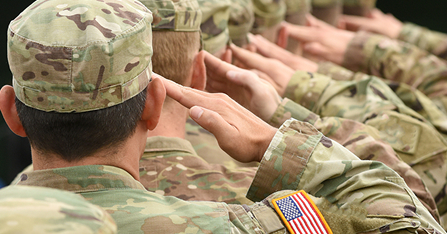Our team explains the purpose and process of filing a VA disability claim with the United States Court of Appeals for Veterans’ Claims.
Summary
- Veterans often face a lengthy process for disability compensation, frequently requiring multiple appeals. Typically, the U.S. Court of Appeals for Veterans’ Claims (CAVC) is the final option.
- The CAVC focuses on legal errors in previous rulings by Veterans Law Judges, not on new evidence.
- Most CAVC cases are reviewed by a single judge, although complex cases may involve a panel.
- CAVC decisions can affirm, remand, or rarely, reverse the previous BVA ruling.
- If veterans disagree with a CAVC ruling, they can appeal to the U.S. Court of Appeals for the Federal Circuit and, in limited cases, the Supreme Court.
Collecting veterans’ disability compensation benefits can be a long and complex process. While some veterans receive benefits after an initial application, most must pursue several appeals to obtain compensation.
While many appeals end with a hearing before a Veterans Law Judge at the Board of Veterans’ Appeals, some applicants may have to take their cases even further.
Former servicemembers who have received several denials can file a Notice of Appeal through the United States Court of Appeals for Veterans’ Claims, often referred to simply as CAVC, with the help of a dedicated attorney from VetLaw’s team.
Bringing a case before the U.S. Court of Appeals for Veterans’ Claims is a serious undertaking. Therefore, it’s important to hire a VA disability benefits attorney with the determination, resources, and expertise to see your appeal through to the end.
VetLaw has been empowering veterans with service-connected disabilities to pursue the VA benefits they deserve for the last decade with undeniable results. You can reach us at (855) 905-1735 or submit a contact form online to schedule a free consultation.

Contact Us Today
We Will Fight For Your Benefits
We guarantee 100% privacy. Your information will not be shared.
Filing Through the United States Court of Appeals for Veterans’ Claims
The United States Court of Appeals for Veterans’ Claims is typically the last available option for former servicemembers who have received denials for disability benefits.
Although certain CAVC decisions may be appealed to the United States Court of Appeals for the Federal Circuit, and even the United States Supreme Court, the jurisdiction of those Courts is limited to reviewing only certain legal issues.
This means that most veterans find their last resort for proving entitlement to service connection at the CAVC.
What Comes Before a CAVC Appeal?
It is important to consider that most veterans will have fought their case for many years before filing an appeal through the United States Court of Appeals for Veterans’ Claims. A claimant must face a denial of benefits at the local level, i.e. a Regional Office, and from the Board of Veterans’ Appeals.
Prior to receiving a denial from the Board of Veterans’ Appeals, most veterans will have a hearing before a Veterans Law Judge. During this BVA hearing, a veteran will have their final chance to submit new evidence and provide testimony about why they should be awarded benefits.


The Narrow Scope of CAVC Decisions in VA Disability Claims
It is only if this hearing fails to produce a favorable outcome that a person may ask the Court of Appeals for Veterans’ Claims to intervene. No additional evidence may be presented to the CAVC. Therefore, it’s important to make sure you provide all new and relevant evidence to the Veterans Law Judge.
The jurisdiction of the CAVC is generally limited to a review of legal or factual errors that a veteran alleges were made by the Board of Veterans’ Appeals. In other words, the Court of Appeals only hears argument based on legal interpretation.
It generally does not rule on the underlying issue of whether the applicant is disabled enough to receive entitlement to compensation. A knowledgeable VA disability appeals lawyer can offer more insight about the processes which must precede filing an appeal through the United States Court of Appeals for Veterans’ Claims.
FAQ: WHAT IS THE EQUAL ACCESS TO JUSTICE ACT (EAJA)?
What Happens at the United States Court of Appeals for Veterans’ Claims?
The United States Court of Appeal for Veterans’ Claims does not accept new evidence when making decisions. In fact, most of these cases do not require a claimant or their attorney to appear in person. The Court will review the entirety of the record, including the veteran’s complete claims file.
Both the veteran and a VA attorney will file legal briefs for the judge’s consideration. In more complex cases, a panel of three or more judges will review the cases. Generally, a single judge will rule on a case.
Then, a single judge or a panel of judges will review the case and issue a written decision. In most situations, the decision will follow one of two paths. One option is the CAVC affirms the Board’s holding.
The CAVC will also often remand the case for further development based on a finding of administrative error made by the judge at the Board of Veterans Appeals. In very rare cases, the CAVC may reverse the Board’s decision and order the VA to grant entitlement to service connection.
Call an Attorney to Learn More about Appealing Your Claim
Many veterans find that their claims for benefits face resistance at both the local and federal level. When you take all necessary legal steps to obtain benefits and still do not receive the payments that you deserve, you should consider your options for filing one more appeal.
The United States Court of Appeals for Veterans’ Claims is often the last chance for claimants to provide entitlement to service connection and obtain disability compensation.
The jurisdiction of the Court is solely vested in reviewing the decisions made by Veterans Law Judges for legal errors. This means that you will not have a chance to submit new evidence. Additionally, you can’t make an argument in person, although some panel cases involve oral argument by legal counsel.
If you believe that the Board made an error in denying your case, or that a judge did not give you a fair chance at your hearing, you should consider an appeal to the CAVC. Call today to discuss the details of your case and the potential for appealing the Board’s decision.
You can reach us at (855) 905-1735 or submit a contact form online to schedule a free consultation.
Frequently Asked Questions
On average, the CAVC only reverses 17 BVA rulings each year. For context, the CAVC receives around 8,000 appeals annually. Therefore, the odds of the CAVC agreeing with a veteran outright are very low. The CAVC overturns about 0.2% of BVA rulings each year.
However, this does not automatically mean that the CAVC fully supports the BVA on all of the remaining appeals. According to the GAO’s report on CAVC rulings, the CAVC returned about 80% of veterans’ cases to the BVA. Essentially, that means the BVA needs to do more work to justify its ruling.
The vast majority of the time, veterans do not appeal BVA decisions to the CAVC for review. In some cases, the case is not eligible for review by the CAVC. This prevents a veteran from appealing the BVA decision, even if they wanted to.
Out of the total appeals the BVA decides each year, only 8% of those appeals are escalated to the CAVC. However, only about 40% of veterans with BVA decisions are eligible to appeal to the CAVC in the first place.
Of the veterans eligible to bring their claim to the CAVC following a BVA ruling, about 20% actually do so. All told, approximately 8,000 Board of Veterans’ Appeals decisions are appealed to the CAVC annually, according to current VA statistics on the BVA.
If you don’t want to accept the CAVC’s ruling on your disability claim, then you can request a reconsideration.
However, you have to submit this appeal within 21 days of the CAVC decision. Depending on the circumstances of your original CAVC case, you may receive a reconsideration in front of a single judge, a panel of CAVC judges, or the full court.
After a CAVC reconsideration ruling, you still have options to appeal a denied claim. The next highest judicial authority is the U.S. Court of Appeals for the Federal Circuit. Like the CAVC, its jurisdiction is limited to reviewing questions of VA law in these types of cases.
Finally, a veteran could potentially take their appeal to the Supreme Court if they are dissatisfied with the Federal Circuit Court’s decision.

